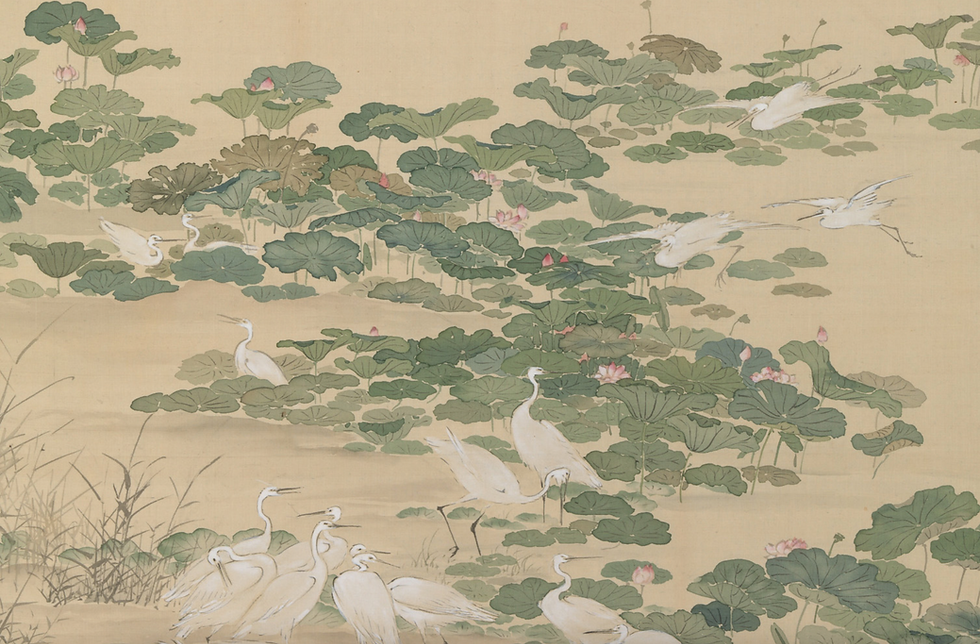Poems Recited at the 2022 Chinese New Year Party
- Ellen Soulliere
- Jul 18, 2022
- 2 min read
Updated: Jul 22, 2022
Contributors to the Poetry Pavilion and I chose seven poems to recite as part of an inaugural Poetry Slam event at the Chine New Year Party, 2022. We began the event by listening to a recording by Helen T. Lin’s father, Professor Dai Junren (戴君仁教授) reciting poems from the Tang dynasty. Among the poems that he recited was Thoughts on a Quiet Night by Li Bo. Li Bo (701-762) is one of the most famous of Tang dynasty poets and Thoughts on a Quiet Night is among the most famous of his many poems. The two poems by Li Bo below are shi 詩poems in five-character regulated verse, with five characters in each line and internal rhymes.

靜夜思 李白 | Jìng yè sī Lǐ Bó | Thoughts on a Quiet Night by Li Bo |
牀前明月光 | Chuáng qián míng yuè guāng | In front of the bed bright moonlight |
疑是地上霜 | Yí shì dì shàng shuāng. | I wonder if it is frost on the ground |
舉頭望明月 | Jǔ tóu wàng míng yuè | I lift my head towards the bright moon |
低頭思故鄉。 | Dī tóu sī gù xiāng. | Then lower it, thinking of my old home. |

月上(Moon Rise) from 销闲清课图(Album Depicting Life of Leisure and Solitude) by 孙克弘 (Sun Kehong, 1532—1611)Ming Dynasty. National Palace Museum, Taipei, Taiwan
****
A less well-known poem by Li Bo explores the pleasures of life as a recluse, who has withdrawn from a life of service to enjoy the pleasures of solitude.
山中答俗人 李白 | Shān zhōng dá súrén Li Bo | Reply to ordinary people from within the mountains by Li Bo |
聞余何意棲碧山, | Wèn yú héyì qī bì shān, | When you ask why I take refuge in Bluestone mountain, |
笑而不答, 心自闲。 | Xiào ér bù dá, xīn zì xián. | I smile and don’t reply, my heart at ease in itself. |
桃花流水杳然去 | Táohuā liúshuǐ yàorán qù | Peach blossoms flow on the water, unfathomably going |
別有天地, 非人間。 | bié yǒu tiāndì, fēi rénjiàn. | to a different heaven and earth, not the human world. |

落花詩意圖 (Poetic Feeling of Fallen Flowers) Shen Zhou (沈周, 1427–1509), Ming Dynasty (1368–1644), Album leaf, Nanjing Museum
~~~~~~~~~~~
Meng Haoran (689-740) was a close contemporary and friend of Li Bo and Wang Wei. He lived the life of a recluse and was famed for the images of nature in his poems. This poem, in five-character regulated verse, is one of his best- known works.
春曉 孟浩然 | Chūn xiāo Mèng Hàorán | Spring Dawn by Meng Haoran |
春眠不覺曉, | Chūn mián bù jué xiāo | Asleep in spring, unaware of the dawn, |
處處聞啼鳥 | chǔ chǔ wén tí niǎo. | Everywhere we heard birdsong. |
夜來風雨聲 | Yè lái fēng yǔ sheng. | In the night came the sound of wind and rain. |
花落知多少? | huā luò zhī duōshǎo? | Do you know how many flowers fell? |

“Peach Blossom and Sparrows” (Detail) from 緙絲(Kesi) Tapestry Album of Birds and Flowers, Qing Dynasty (1644-1911) Palace Museum, Beijing, China
~~~~~~~~~~
Li Qingzhao (1084-ca. 1155) was born in Jinan, in present-day Shandong Province into a highly cultured, highly literate family. Her mother was a noted poet. Li Qingzhao married the scholar-official, Zhao Mingcheng, when she was 18 and together they enjoyed books, poetry, calligraphy, and the study of ancient bronzes. She endured the fall of the Southern Song and the death of her husband. Most of Li Qingzhao’s poems are ci 詞 poems. In this style of poetry, verses are written to fit pre-existing musical tunes. As in the two examples below, the lines are often of different lengths.
如夢令 李清照 | Rúmèng lìng Li Qingzhao | To the tune of ‘As if in a dream’ by Li Qingzhao |
常記溪亭日暮。 | Cháng jì xī tíng rì mù. | I often remember sunset in a river pavilion. |
沈醉不知歸路。 | Chén zuì bù zhī guī lù. | Sunk in drunkenness, we didn’t know the way back. |
興盡晚回舟 | Xīng jìn wǎn huí zhōu | The excitement over, we returned late to the boat |
誤入藕花深處。 | Wù rù ǒu huā shēn chǔ. | But by mistake entered a place deep in lotus flowers. |
爭渡。 | Zhēng dù. | Struggling to get through, |
爭渡。 | Zhēng dù. | Struggling to get through, |
驚起一灘鷗鷺。 | Jīng qǐ yī tān ōu lù. | We startled a sandbar of egrets into flight. |

蓮池白鷺図 ( Lily Pond with Egrets, ca., 1852) detail. Egrets in a Lotus Pond by 山本梅逸筆(Yamamoto Baiitsu, Japanese, 1783–1856). Metropolitan Museum of Art, New York City
****
如夢令 李清照 | Rúmèng lìng Li Qingzhao | To the tune of ‘As if in a dream’ by Li Qingzhao |
昨夜雨疏風驟。 | Zuó yè yǔ shū fēng zhòu. | Last night the rain was sparse and the wind strong. |
濃睡不消殘酒, | Nóngshuì bù xiāo cán jiǔ. | Deep sleep did not dispel the traces of the wine. |
試問捲簾人 | Shì wèn juǎn lián rén, | I tried asking the person who rolled up the blinds |
却道海棠依舊。 | Què dào hǎitáng yī jiù. | and they said the crab-apple blossoms were as of old. |
知否? | Zhīfǒu? | Do you know? |
知否? | Zhīfǒu? | Do you know? |
應是綠肥紅瘦 | Yīng shì lǜ féi hóng shòu. | The greens must be plump, and the reds must be slender. |

海棠禽兔( Begonia, Bird and Rabbit, ca. 1759, detail) by 华嵒 Hua Yan (1682-1756) Qing Dynasty. Palace Museum, Beijing, China

Comments